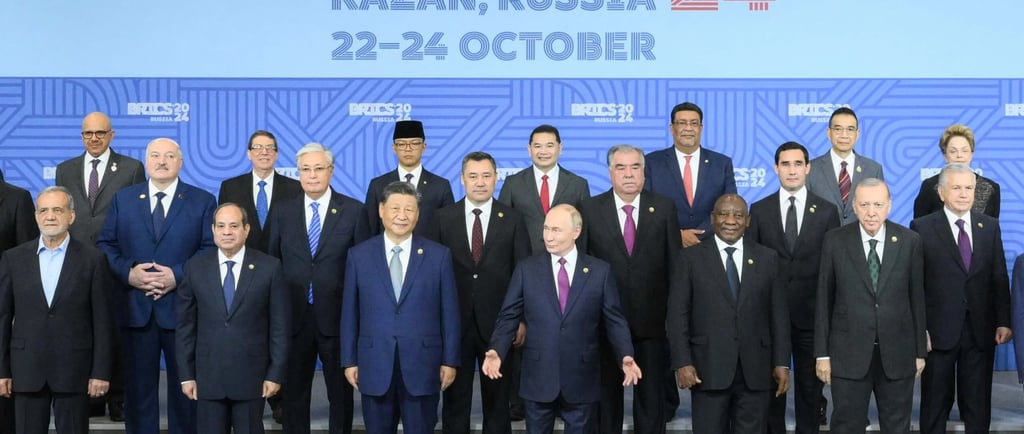Venezuela: BRICS Membership vetoed by Brazil in a bid to balance East and West
The 16th BRICS summit in Kazan highlighted the alliance's growing influence and the contentious dynamics surrounding its expansion, as Venezuela's bid for membership faced significant opposition from Brazil. With such varied political interests within the bloc, can BRICS continue to expand while preserving its unity and relevance?
VENEZUELA
Daria Maiorova
11/2/20243 min read


The 16th BRICS summit, held this year in Kazan, Russia, has underscored the expanding influence of the BRICS alliance, while also highlighting the complexities of membership expansion. Attended by representatives from 36 countries and key international organizations, the summit brought together leaders, including Venezuelan President Nicolás Maduro, who aimed to rally support for Venezuela’s entry into the alliance. However, despite Russia’s endorsement, Brazil’s reservations have presented a significant obstacle, effectively vetoing Venezuela and Nicaragua’s BRICS bids.
President Maduro, accompanied by top Venezuelan officials, including Foreign Minister Iván Gil and Vice President Delcy Rodríguez, used the platform to advocate for the alliance’s continued evolution and to position Venezuela as a potential asset to BRICS. Maduro emphasized the bloc’s importance, describing BRICS as the “epicenter of the new, multipolar world,” and called for a reformation of international structures, particularly the United Nations. He proposed that BRICS assume a greater role in establishing a new economic order, suggesting a reformulated global monetary system and calling for a more active stance on global issues such as conflicts in the Middle East.
Venezuela’s appeal to BRICS aligns with its broader strategy to diversify its international partnerships and enhance economic collaboration outside the influence of Western powers. Caracas is attempting to remedy its international isolation, which has worsened since the country’s controversial, and much-criticized, election in July.
BRICS Plus, the bloc’s expanded format, has already incorporated several countries, including Iran, Egypt, Ethiopia, the United Arab Emirates, and Saudi Arabia. Yet, consensus remains crucial for new admissions, and Brazil’s objections have proven formidable. President Vladimir Putin openly acknowledged these differences, explaining that the BRICS admission process operates solely on consensus. Although Russia has endorsed Maduro’s leadership and recognized his 2024 election as legitimate, Brazil’s stance contrasts sharply. Brazilian President Luiz Inácio Lula da Silva has expressed concerns about Venezuela’s internal politics, particularly electoral legitimacy and human rights issues, which have influenced Brazil’s position.
The Kazan summit further highlighted strained relations between Brazil and Venezuela. Brazil’s reluctance stems from ongoing diplomatic disputes, including disagreements over political asylum for Venezuelan opposition members at the Argentine Embassy in Caracas and Brazil’s criticisms regarding Venezuela’s electoral processes. These tensions underscore the broader ideological divide between the two nations, with Brazil demanding greater transparency and reform from Venezuela before extending support for its BRICS candidacy.
Despite these diplomatic challenges, Venezuela remains committed to its BRICS aspirations. In his address, Maduro expressed Venezuela’s readiness to contribute to the bloc’s goals, particularly in advancing economic collaboration among emerging markets and promoting a multipolar world. Venezuela’s supporters, including Russia and Belarus, praised its dedication to sovereignty and resilience in the face of international pressure, underscoring its alignment with BRICS’ anti-hegemonic, “multipolar” values.
The final declaration of the BRICS summit outlined several key resolutions, such as reaffirming commitment to United Nations reform, advocating for the use of national
currencies in international trade, and strengthening the BRICS Development Bank. However, no new members were admitted, and the summit concluded without adding Venezuela to the list of official candidates for BRICS partnership, in part due to Brazil’s opposition. In contrast to the veto powers in other international alliances, BRICS requires unanimous agreement for new admissions. Putin noted that while Russia and Venezuela share a longstanding partnership, he respects Brazil’s right to oppose Venezuela’s application based on consensus.
Looking ahead, Venezuela’s path to BRICS membership will likely depend on its ability to address concerns raised by Brazil and foster stronger diplomatic relations within the alliance. In his closing remarks, Maduro affirmed Venezuela’s commitment to the BRICS vision and expressed optimism about future integration. “Venezuela stands ready to contribute to the creation of a new multipolar world order,” he said, reinforcing his commitment to strengthening alliances that align with Venezuela’s ambitions.
While Venezuela’s entry into BRICS remains uncertain, the country’s involvement in the Kazan summit signals its intent to play a more active role in global geopolitics. For BRICS, the challenge lies not only in expanding its influence, but in maintaining unity amidst diverse political and economic interests, a balancing act essential to the bloc’s continued relevance on the world stage.
As for Brazil, its diplomats consider Venezuela’s continued exclusion from BRICS crucial, as an endorsement of Maduro’s government could discredit Brazil and lessen its prestige in the Western Hemisphere. This would not align with Brazil’s India-style goal of striking a balance between its Western and BRICS partners.


